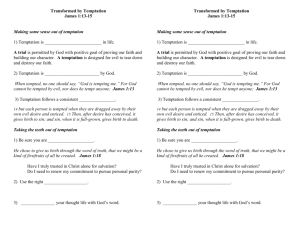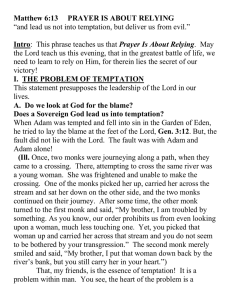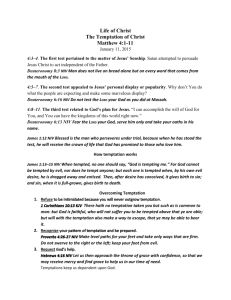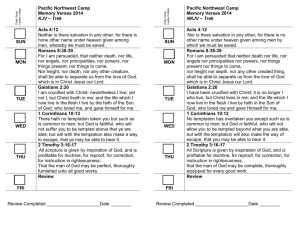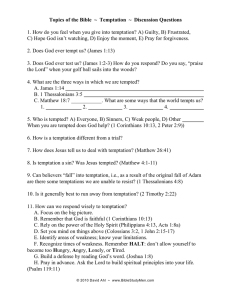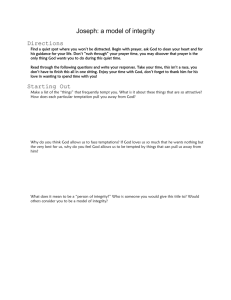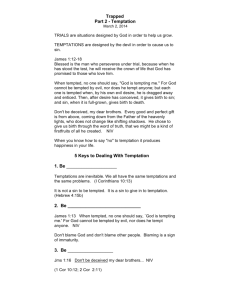Week One: James 1:9-18 - Germantown Presbyterian Church
advertisement
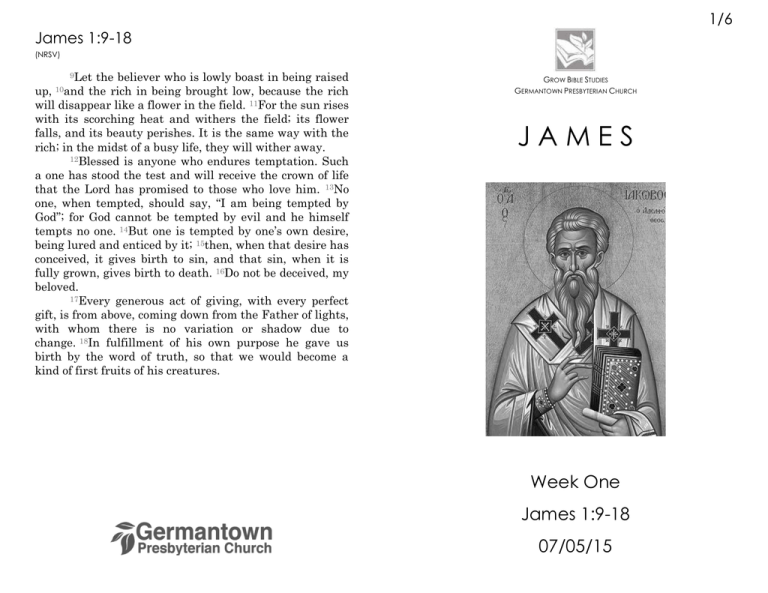
1/6 James 1:9-18 (NRSV) 9Let the believer who is lowly boast in being raised up, the rich in being brought low, because the rich will disappear like a flower in the field. 11For the sun rises with its scorching heat and withers the field; its flower falls, and its beauty perishes. It is the same way with the rich; in the midst of a busy life, they will wither away. 12Blessed is anyone who endures temptation. Such a one has stood the test and will receive the crown of life that the Lord has promised to those who love him. 13No one, when tempted, should say, “I am being tempted by God”; for God cannot be tempted by evil and he himself tempts no one. 14But one is tempted by one’s own desire, being lured and enticed by it; 15then, when that desire has conceived, it gives birth to sin, and that sin, when it is fully grown, gives birth to death. 16Do not be deceived, my beloved. 17Every generous act of giving, with every perfect gift, is from above, coming down from the Father of lights, with whom there is no variation or shadow due to change. 18In fulfillment of his own purpose he gave us birth by the word of truth, so that we would become a kind of first fruits of his creatures. 10and GROW BIBLE STUDIES GERMANTOWN PRESBYTERIAN CHURCH JAMES Week One James 1:9-18 07/05/15 JAMES Week One: James 1:9-18 1) The Book of James is sometimes called the “wisdom literature” of the New Testament. Wisdom literature is a label often given to a portion of the Old Testament— Proverbs is probably the best example. From the portion of James shown in this passage, what do you think is meant by calling the Book of James “wisdom literature”? Take a moment to browse through a section or two of Proverbs. What similarities do you notice between Proverbs and this passage in James? See also Luke T. Johnson’s thoughts in (1). 2) Vv. 9-11 have some strong words concerning poverty and wealth. What do you think is meant by calling for the rich to boast “in being brought low” (v. 10)? 3) Temptation is the main issue in vv. 12-16. What do you think it means to endure temptation (v. 12)? Why is one who does endure temptation considered “blessed” (v. 12)? What do you think is meant by the promised “crown of life” (v. 12)? 4) A key component to James’ understanding of temptation is that it does not come from God (v. 13). He instead places the root of temptation in “one’s own desires” (v. 14). What implications are there in saying that temptation isn’t an external force but is rather an internal corruption? 5) What does it mean for generosity to be “from above” (v. 17)? Why would James follow a discussion about temptation with a word about generosity? Do you see any connections between resisting temptation and generosity? 6) One common thread through James’ respective treatments of wealth (vv. 9-11), temptation (vv. 12-16), and generosity (vv. 17-18) is the notion that serving our own interests—be they greed, lust, or otherwise—“gives birth to death” (v. 15), while serving and giving to others is “from above” (v. 17). What do you think is the conventional, cultural wisdom when it comes to serving your own interests? Is it promoted or discouraged? What should our response be as Christians? ---------------------------------(1) “As wisdom literature, James challenges readers…more directly than do narratives about Jesus or discussions by Paul. Readers are presented with commands that are supported by warrants…. [Readers] must go beyond the testing of the text against theory to the testing of the their lives against the text: ‘Will we now see and think and speak and act in this way?’” –Luke T. Johnson (2) “This passage teaches us, that we ought to be so affected by God’s innumerable blessings, which we daily receive from his hand, as to think of nothing but of his glory; and that we should abhor whatever comes to our mind, or is suggested by others, which is not compatible with his praise.” –John Calvin (3) “Learn…to look at the world inside out and upside down, as Jesus constantly taught. Don’t allow your imagination to be drawn into the snare. See things as God sees them.” –N.T. Wright




